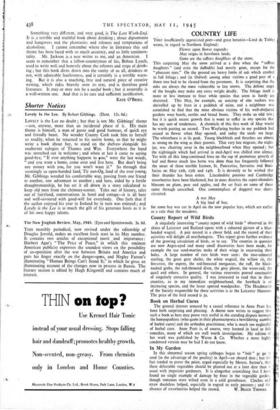THAT insufficiently appreciated poet—and great botanist—Lord de Tabley wrote, in
regard to Northern England:
Flower upon flower expands : May reigns in hawthorn lands.
Gone are the saffron daughters of the snow.
This surprising May the snow arrived at a date when the "saffron daughters " (and even the daffodils) had mostly gone, except for the "pheasant eyes." On the ground are heavy limbs of oak which crashed in full foliage ; and (in Oxford) among other victims- a good part of a thorn tree had to be cleared from the pavement. It is surprising that the oaks are always the most vulnerable to late snows. The defiant angle of the boughs may make any extra weight deadly. The foliage itself is more or less immune to frost while species that seem as hardy are shattered. This May, for example, an outcrop of elm suckers was shrivelled up by frost in a paddock of mine, and a neighbour was astonished to find that the most obvious victims of his well-sheltered gardens were hazels, nettles and broad beans. They make an odd trio ; but it is quick recent growth that is wont to suffer in any species that has any sort of tenderness. A chronicle of this first week of May would be worth putting on record. Two Wayfaring bushes in my paddock had ceased to flower when May opened, and today the seeds are large. The whitethorn is at its peak. Young blackbirds and thrushes are almost as strong on the wing as their parents. That very late migrant, the night- jar, was churring away in the neighbourhood when May opened ; but the nightingale which had arrived in mid-April was chilled into silence. Yet With all this long-continued frost on the top of premature growth of leaf and flower much less harm was done than has frequently followed the onset of those terrible Icemen, St. Pancratius, Servatius and Boni- facius on May Izth, 13th and 54th. It is devoutly to be wished that their thunder has been stolen. Lincolnshire potatoes and Cambridge strawberries have been blackened, but in most districts the super-abundant blossom on plum, pear and apples, and the set fruit on some of these came through unscathed. One commonplace of doggerel was short- circuited.
A wet May A big load of hay, for some hay was cut in April on the now popular leys, which are earlier as a rule than the meadows.
County Report of Wild Birds
A singularly interesting " county report of wild birds " observed in the shires of Leicester and Rutland opens with a coloured picture of a blue-
headed wagtail. A pair nested in a clover field, and the record- of their activities will delight all ornithologists. This report gives further evidence of the growing circulation of birds, so to say. The counties in question are now Argus-eyed and many small discoveries have been made, for example the use sand-martins make of their wings in excavating their holes. A large number of rare birds were seen : the rose-coloured starling, the great grey shrike, the white wagtail, the willow tit, the fire-crest, the osprey, the red-breasted merganser, the ruff, the black- necked grebe, the red-throated diver, the grey plover, the water-rail, the quail and others. In general, the various reservoirs proved sanctuaries of singularly attractive quality. I was interested to read that in those counties, as in my immediate neighbourhood, the hawfinch is an increasing species, and the lesser spotted woodpecker. The Headmartin of the Society responsible for these activities is at the Leicester Museum. The price of the bird record is 35.
Book on Herbal Cures The general interest aroused by a casual reference to Anne Pratt has been both surprising and pleasing. A doctor now writes to suggest that such a book as hers may prove very useful in the standing dispute between the homeopathists (who quote in their pharmacopoeia a bewildering number of herbal cures) and the orthodox practitioner, who is much too neglectful of herbal cure. Anne Pratt is, of course, very learned in local or folk remedies, many of which are well worth investigation. My edition of her work was published by Warne & Co. Whether a more highly condensed version may be had I do not know.
In My Garden In this abnormal season spring cabbages began to " bolt " er go t3 seed (to .the advantage of the poultry) in April—an absurd date ; but the fact tended to prove the point, urged especially by Messrs. Sutton's, that these delectable vegetables should be planted out at a later date than 13 usual with impatient gardeners. It is altogether astonishing that I have found no single example of damage by frost in the vegetable garden. though tomatoes were wilted even in a cold greenhouse. Cloches and straw doubtless helped, especially in regard to early _potatoes ; and thz absence of strawberries helped the record. W. BEACH THOMAS.






















 Previous page
Previous page